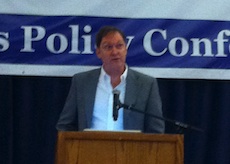In the recently-decided McDonald v. Chicago, Justice Scalia wrote his own opinion specifically to refute Stevens’, and he does a far better and more convincing job than I ever could (seeing as he’s, you know, a Supreme Court Justice and all). Still, here’s my shot at it:
First of all, Stevens’ basic point is that firearms require balancing out the costs with the benefits:
Hence, in evaluating an asserted right to be free from
particular gun-control regulations, liberty is on both sides of the equation. Guns may be useful for self-defense, as well as for hunting and sport, but they also have a unique potential to facilitate death and destruction and thereby to destabilize ordered liberty. Your interest in keeping and bearing a certain firearm may diminish my interest in being and feeling safe from armed violence. And while granting you the right to own a handgun might make you safer on any given day—assuming the handgun’s marginal contribution to self-defense outweighs its marginal contribution to the risk of accident, suicide, and criminal mischief—it may make you and the community you live in less safe overall, owing to the increased number of handguns in circulation. It is at least reasonable for a democratically elected legislature to take such concerns into account in considering what sorts of regulations would best serve the public welfare.
It may seem like Stevens is arguing against legal gun ownership, but if you read carefully, it’s not too hard to see the danger of his words to all civil rights. For if it is “at least reasonable for a democratically elected legislature to take such concerns into account” when it comes to guns, why could the same not be done for, say, books? Why not criminal justice, and allow legislatures to override Miranda protections if a democratic majority wills it? Would it be appropriate for a democratic majority to be able to entirely prohibit abortion or criminalize homosexuality?
Stevens’ arguments would indicate so, and he walks a dangerous line by placing such faith in majorities. these arguments in favor of pure majoritarian rule are just as applicable to other civil rights currently rendered off-limits to legislative tampering.
But wait, it gets better:
…it is a foundational premise of modern government that the State holds a monopoly on legitimate violence…
[…]
The power a man has in the state of nature “of doing whatsoever he thought fit for the preservation of himself and the rest of mankind, he gives up,” to a significant extent, “to be regulated by laws made by the society.”
[…]
I have found [no court case] that holds, states, or even suggests that the term “liberty” encompasses either the common-law right of self-defense or a right to keep and bear arms…
Did you catch that? Stevens argues that the right to preserve one’s own life from attack is not a component of liberty. Apparently, the government could ban self-defense without infringing on freedom, because it “holds a monopoly on legitimate violence”. According to Justice Stevens, someone could try to murder you, and if you fight back, it’s not unreasonable that you could be thrown in jail, because your use of violence to repel the attack was “illegitimate.” This is scary stuff.
Nevertheless, it does not appear to be the case that the ability to own a handgun, or any particular type of firearm, is critical to leading a life of autonomy, dignity, or political equality: The marketplace offers many tools for self-defense, even if they are imperfect substitutes, and neither petitioners nor their amici make such a contention.
So handguns can be banned because they’re not “critical to leading a life of autonomy, dignity, or political equality”, or because poorer substitutes exist? Hmm, what other rights can we apply this to? I know! Gandhi’s autobiography The Story of My Experiments With Truth can be banned because Danielle Steele novels are still available! Abortion can be banned because one can live a life of autonomy, dignity, or political equality without ever having one!
Does Stevens really want to go down this rabbit hole? He eventually does explain why his logic should be specially applied to firearms and firearms alone:
Similarly, it is undeniable that some may take profound offense at a remark made by the soapbox speaker, the practices of another religion, or a gay couple’s choice to have intimate relations. But that offense is moral, psychological, or theological in nature; the actions taken by the rights-bearers do not actually threaten the physical safety of any other person.
Stevens is concerning himself only with the direct effects of the misuse of rights, and hand-waving away the indirect effects of their exercise. For example, while it is true that by exercising his Miranda right to remain silent, a criminal is directly hurting nobody, should his confession be thrown out on Miranda grounds, that very much subtracts from public safety. Letting a dangerous person go free to prowl the street, for whatever reason, is a tangible endangerment of the community, and one that Stevens apparently thinks is an acceptable price to pay for the right itself.
Moreover, what constitutional provision informs Stevens’ reasoning here? Where is it laid out that a specific enumerated constitutional right can be treated differently from the rest solely because its misuse can result in death rather than merely moral or spiritual offense? We’re not talking about a random law enacted by a rogue legislature here, we’re talking about the second freaking amendment in the Bill of Rights!
Continuing on, we encounter this gem:
Fifth, although it may be true that Americans’ interest in firearm possession and state-law recognition of that interest are “deeply rooted” in some important senses, ante, at 19 (internal quotation marks omitted), it is equally true that the States have a long and unbroken history of regulating firearms.
Did you catch that? Apparently, a “long and unbroken history” of restricting a right can itself be the justification for its indefinite continuity. I bet the Southern states would have really liked this idea 150 years ago! Can you imagine their glee upon learning that their “long and unbroken history” of repressing blacks was a permissible counterbalance to blacks’ “deeply rooted” interest in being free from government-backed repression?
Stevens hammers the point home in a footnote:
I agree with JUSTICE SCALIA that a history of regulation hardly proves a right is not “of fundamental character.” Ante, at 12. An unbroken history of extremely intensive, carefully considered regulation does, however, tend to suggest that it is not.
Again we see his opinion that a government can destroy the “fundamental character” of a right through “an unbroken history of extremely intensive, carefully considered regulation.” It’s almost unreal.
So long as the regulatory measures they have chosen are not “arbitrary, capricious, or unreasonable,” we should be allowing [states and localities] to “try novel social and economic” policies.
I guess Stevens never heard of the Chicago Alderman who forgot to re-register his guns (which, according to Chicago law, makes them permanently un-registrable and therefore felonious to possess) and promptly passed a one-month registration amnesty that curiously happened to allow him to re-register them. Nope, nothing arbitrary, capricious, or unreasonable about any of that!
…the elected branches have shown themselves to be perfectly capable of safeguarding the interest in keeping and bearing arms.
Sooooo… then why was Otis McDonald suing the city of Chicago for denying him the right to purchase and own a handgun? Apparently in Stevens’ world, “banning” can be a legitimate form of “safeguarding.”
The strength of a liberty claim must be assessed in connection with its status in the democratic process. And in this case, no one disputes “that opponents of [gun] control have considerable political power and do not seem to be at a systematic disadvantage in the democratic process,” or that “the widespread commitment to an individual right to own guns . . . operates as a safeguard against excessive or unjustified gun control laws.”
I see. So then, because we have the ACLU, couldn’t we safely do away with the First Amendment? After all, it sure seems that lovers of free speech “have considerable political power and do not seem to be at a systematic disadvantage in the democratic process.” I also see that “the widespread commitment to an individual right to” free expression is alive and healthy. Under this standard of review, the rights most respected and exercised by the public at large deserve the least judicial protection from legislative infringement. Now that’s some enlightened constitutional law for you!
In making these spirited arguments against guns, Stevens seems almost unaware that his broad endorsements of government authority and majoritarian rule severely endanger the remaining rights and liberties he does seem to like. This unsettling contradiction unfortunately never seems to dawn on him. If I didn’t know it any better, I would think that the writer of this dissent believed in almost no constitutionally-protected personal liberty at all.









